Timing is everything. And Michael Hobbes, an old aid hand and human rights consultant, got the timing spot on with his recent blog at The New Republic on how “big ideas are destroying international development”.
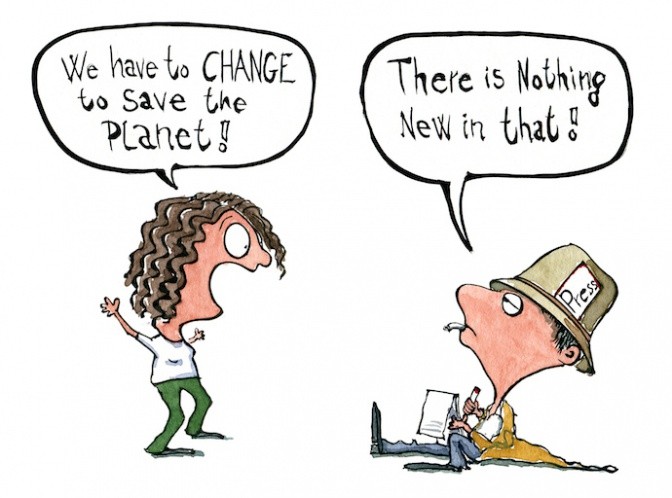 Drawing by Frits Ahlefeldt
Drawing by Frits AhlefeldtAs the international aid community labours hard to deliver a set of the biggest of all big ideas – the Sustainable Development Goals (SDGs), due to be laid before the UN next year – he argues that this is just about the worst way of doing good.
Our expectations are broken
Could be, he is right. It feels like everyone from the CGIAR network to small humanitarian agencies and environmental NGOs has got hooked on an idea that was, not so very long ago, very unfashionable: the notion that big is beautiful and any idea or project that won’t scale up and be endlessly replicable is a waste of time and money.
He may exaggerate. And aiming for the moon may always be no bad thing, even if we usually fail.
But his argument is that in too much do-goodery, the evidence base quickly gets left behind. To check if you are achieving what you hope, as you spend donors’ money, can be seen as defeatism. And an addiction to putting all that money on some big idea that “we can simply unfurl” compounds the problem.
The truth is more prosaic. Deworming, text books and PlayPumps will all work in some places – in some social environments and some landscapes -- but not in others. There is no substitute for the hard graft of finding out which is which. Hobbes is a sceptic, not a cynic. “It’s not that development is broken, it’s that our expectations of it are,” he says.
Even the green revolution, one of the great “big ideas” of the late 20th century, while a spectacular success in much of Asia and the Americas, crashed in Africa, the hungry continent.
Where did we go wrong?
His dictum applies to presumed technical fixes, but also, I think, to big targets.
Take the Millennium Development Goals. The aid community threw the kitchen sink at halving the number of people without access to basic sanitation. But it ended up giving millions of people toilets that had nowhere to drain beyond the yard, the lane or the nearest pond. In cities like Dhaka, all that effort spread the risk rather than containing it.
No doubt the SDGs will do much the same.
Where did we go wrong? I think Hobbes is right to identify scale as a vital issue here. “We should all dream a little smaller,” he concludes. The aid world rather forgot what many of us thought had been learned a generation ago: that this kind of top-down prescriptive thinking was part of the problem.
It’s time to listen
But it is not just about scale. The aid community has also forgotten to ask would-be recipients what they think. The two problems are undoubtedly linked. The search for the big idea suggests that the big person who thought of it has the solution. It just needs rolling out.
A better way would be to think small, but also to ask and to listen. To stop playing the lord of the manor handing out Christmas charity.
Often what is required is time and attention to detail. It requires being specific to local people, local needs and local landscapes. It requires people who know their business spending time in the field rather than at their desks writing fund-raising proposals.
I am a journalist. I flit in and out of places. A week anywhere is a long time for me. So perhaps I am the last person to preach this message. But I have spoken to enough people at the receiving end of aid to know that what they crave is engagement, time, consistency and above all people who listen and act on what they are told. Not much aid work these days looks like that.
Who cares anyways?
In recent months, I have been to the inner Niger delta in Mali, where aid people come and go. Their equipment and projects, whether water pumps or rice hullers or tree planting schemes, often lie untended and often abandoned. The reasoning, villagers say, is not just that they can’t get the spare parts or that the project didn’t meet their needs. They say if the foreigners thought so little of the project that they walked off and left it, then it can’t be much good anyhow.
Equally, as I also saw, if the aid providers spent time in advance asking what the villagers wanted, take time in delivering it, and in coming back, asking questions about how it is going and generally looking as if they cared, then the villagers cared too.
Most of us, if we think about it, live by similar rules of thumb. Why should aid recipients be any different?
Survival of the fittest project
 Successful wetland rehabilitation in Aceh. Photo: Fred Pearce
Successful wetland rehabilitation in Aceh. Photo: Fred Pearce
I returned from Aceh, the Indonesian province where some 160,000 people died during the tsunami ten years ago this month. After the disaster, a lot of effort went into ecological rehabilitation. Especially planting mangroves and shelter belts of trees that could provide both livelihoods for shattered coastal communities and protection against future cyclones and – God forbid – another tsunami.
There were two sorts of tree planting rehab projects. One sort, promoted by foreign NGOs or the Indonesian government, was cash-for-work schemes. Most of them failed. They didn’t fit the community ethos of most villages. Collective work is valued. So, with the job done, cash obtained and saplings planted, the villagers mostly left the saplings to the vagaries of the waves and the wild animals. Little sign of them remains.
The other sort – promoted by Wetlands International, an environmental NGO with whom I travelled – was carried out by self-created village groups in return for collateral-free micro-credit to set up community enterprises like cafes or cattle rearing farms. Under the Green Coast project, the deal was that if the trees were nurtured well enough to survive for two years, then the credit did not have to be paid off.
Attention pays off
You may not be surprised to learn that these trees survived far better. Wetlands International claims an 83 per cent survival rate. Thousands of hectares have been replanted around some 70 villages. The coast is being greened.
Villagers told me they felt they had a more contractual relationship, between their community and the donors, that was much more than a foreign handout. They had ownership. But they said something else, too. Wetlands International had local partners – individuals who lived in the villages. People who had often shared the catastrophe of the tsunami. And they came round every few weeks, charting progress on planting and protecting the trees. Nobody was allowed to forget the project and go back to normal hand-to-mouth living.
Such attention pays off. If the project is tailored to local needs and landscapes, then it will be respected. If you care – personally and in person – then so will they.
Here is my big idea: big ideas suck.











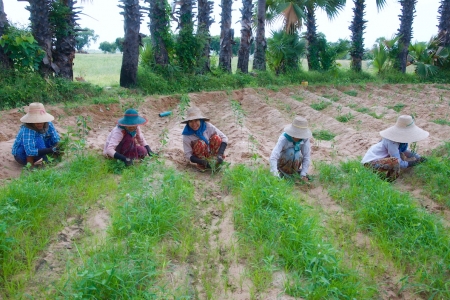
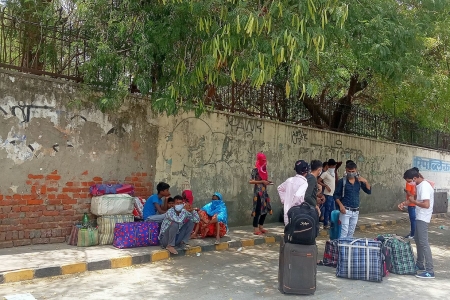




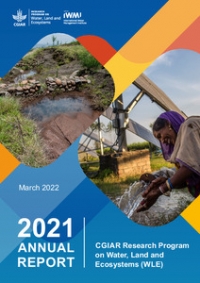
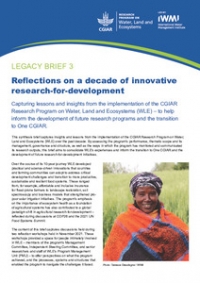
Comments
Mr. Pearce is certainly thinking more in the long term and more clearly than many. I worked six-weeks on a big, initially well organized CARE five year project in Upper Egypt, the resident U.S. leadership remarked that they had just started to make progress: "so far we have trained them just enough to be dangerous (to themselves)!" Six months later there was a glowing independent review --- and a month later CARE fired everyone and pulled out! The employees included local area leaders, and there were also village leaders who were elected by village peers. However, the "rug was pulled out.
I have also worked on projects with dedicated, local leadership, who depended on outsiders only for training and support. Hopefully, I did valuable training, but they all needed continuing support that was rarely adequate.
Good observations. What action to take other than not scaling up? And how about the whole 'scaling-up circus' meeting around the world? Scale it down? Do we need 'development priests'? All around development staff knows best practice and scaling up as well as financial proxy's are toys for the West. And the know the (local) context counts :-) It the political economy....
Just thought I'd share some relevant reading from a different but not THAT different sector.
"Design for Everyone is Design for No One: How Focus Leads to Bigger Impact": https://www.designthatmatters.org/blog/2014/10/28/firefly-essay-3